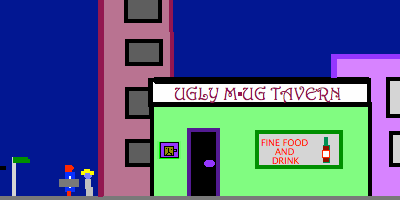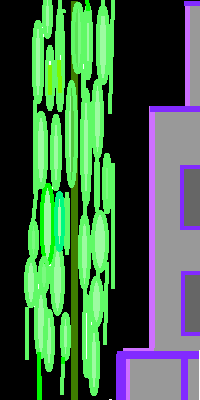edited by professor dan leo
illustrated by rhoda penmarq and konrad kraus
executive producer: kathleen maher
part three of fifteen
to begin at the beginning, click here
  After my customary sigh I was about to reach for the door handle again when I had a cautionary thought. I raised the box up with the palm of one hand, and with the thumb and forefinger of my other hand I lifted the lid just enough to peek in. “Do me a favor,” I said. “And just be quiet in front of my friends.”  “Certainly. And you will do me the favor of taking me out of this box when we get inside. I’m sure your friends would be delighted to bask in my beauty.” “Well, okay,” I said, just as two coast guardsmen came out of the door amidst a wave of music and badinage and laughter from within. I made a coughing sound, fumbling the lid closed and shifting the box back under my arm, all in an absurd attempt to disguise the fact that I had just been conversing with a child’s doll, but luckily the coast guard boys were paying no attention to me, or, even if they had noticed my insane behavior, they just didn’t care. At any rate they ignored me and walked off.  “Close call!” she said, from within the box. I grabbed the handle of the door before it could close, but I wasn’t going to get into the Ugly Mug that easily, because just then an old man pushed or fell against the door from inside, stumbled right into me and at once began to slide down my body towards the pavement while his hands scrabbled weakly at my arms. Was I never to be set free from little old men this night?  Keeping the doll box under my right arm, I bent down and raised him up by grabbing him under his upper right arm with my left hand. “Woops,” he said. I knew him by name, or at least by his last name -- Mr. Jones. I had seen him often around town, usually in some bar or other, always neatly dressed in a grey suit and a little straw fedora with a feather in it.  “Thank you, neighbor,” he said. And then, after a pause: “Do I know you?” “I don’t think so,” I said. The door of the bar closed behind him on its hydraulic closing mechanism, shutting away the sounds of merriment.  “I’ve seen you around,” he said. “You’re the Schneider sisters’ nephew, right? Arnold, isn’t it?” “Yes,” I admitted. I tentatively let go of his arm, and he didn’t fall down.  “It has been suggested that I go home, Arnold.” “Oh. Well, good night then.” “I’m eighty-three years old.”  “Oh, well, that’s great,” I said, in all my insipidity. “Eighty-three years old.” “That’s uh, really great,” I lied through my teeth.  “Eighty-three years of age.” “That’s, um --” He smelled like whiskey, and tobacco, like an old National Geographic.  “Eighty-three,” he said. “But I’m finally starting to learn my limit.” He stared at me for a few moments, swaying just slightly, then he shifted his gaze to the box under my arm. He tapped the lid.  “What’s in the box?” “It’s -- um --” “Nothing!” piped the doll, slightly muffled by the box.  “What?” said Mr. Jones. “What?” I said. “Did you hear something?”  “No. No, I didn’t hear anything,” I said, “in particular.” “Odd,” he said. Suddenly he began to wobble, like a marionette whose puppeteer has begun to doze off. I stuck my free arm under his right arm, again, and yanked him up against my side.  “Mr. Jones.” “You know my name.” “Yes,” I said.  “Take me home, Arnold. I seem to have a drop too much partaken this evening.” My heart sank. It was true, I would never make it back into the bar tonight. Elektra would think me insane. And she wouldn’t be wrong.  “Where do you live, Mr. Jones?” “Just up the way there,” he said, pointing vaguely up Decatur Street in the direction away from the beach. “Not far. Not very far.” “Okay,” I said. “But look, I just have to check in with my friends in the bar here, okay?” “Yes.” I let go of his arm.  “I’ll just be a minute,” I said.  “Of course.” “So just stand here.” “Certainly,” he said, but then he began swaying again, in a circular motion, so that the only question was not whether he would fall but in which direction. I grabbed his arm and steadied him. “Okay,” I said. “Let’s just go.”  “Right. Let’s go,” he said, and off we went, with Mr. Jones hanging onto my left arm. We crossed Washington Street; it seemed as if I had already crossed at this intersection dozens of times this evening.  We walked slowly, and he only stumbled and began to fall perhaps every third step or so.  He began to speak, coherently, but slowly, pausing between each phrase, each sentence. Sometimes he would pause between words within a phrase, or even between two syllables of the same word. Sometimes a pause would last so long that I thought he might have abandoned his train of conversation entirely, but then suddenly another phrase or word or syllable would emerge from his papery old mouth, to be followed by yet another pause. “This is what I do,” he said. “I drink. And talk to random strangers. In the mornings I suffer. I take a bath and smoke cigarettes with a wet rag over my eyes, and then I go to a coffee shop and eat bacon and eggs and drink copious cups of coffee while reading the previous day’s Philadelphia Bulletin in its entirety.  If my name is not listed in the obituaries I go to my room and rest and dream of my life such as it was and is. Then I get up, get dressed and go out and get drunk again. Turn down Lyle Lane here.” Slowly we went down the lane, which, although it was only a block from Washington Street, was dark and quiet, covered over with the gently stirring leaves of old trees.  “I see you’re limping, Arnold. How did you hurt your leg?” I had forgotten about my leg, but now that he mentioned it I was indeed limping, and my leg hurt. How had I managed to do all that running and carrying with Mr. Arbuthnot? Pure adrenaline I suppose. “You don’t have to tell me,” he said. “It’s none of my business.”  “It was an embarrassing accident,” I said. “Say no more.” He stopped suddenly.  “Is this where you live?” I asked. “No. I want a cigarette.” He disengaged his arm from mine and slowly brought a pack of Old Golds out of his side jacket pocket. He poked into it with his old fingers and began to extricate a cigarette, and as he did he teetered gently back and forth. I stood ready to catch him if need be. Finally he got a cigarette out and into his lips. He re-pocketed the package of cigarettes and began patting his pockets.  “Do you have a light?” he asked me. “No,” I said. “I’m quitting smoking.” “Very sensible.”  He continued to pat and to search his pockets. I became aware of the sound of crickets snickering in the darkness, and of lightning bugs flicking on their little greenish lights and diving up and down like tiny roller coaster cars. Finally Mr. Jones found a book of matches. To speed things along I took the book from his fingers and gave him a light. They were Sid’s Tavern matches.  “Thank you,” he said, and then coughed. I handed him back the matches, and he dropped them into a jacket pocket. He put his arm in mine and we resumed walking. After about five or six more feet he gestured to the left with his cigarette and said:  “There’s my boarding house, here.” It was a large dark old Victorian house, like hundreds of others in town, maybe a little more run-down than average. The front gate of the picket fence was open. “I can make it from here,” he said. “Thank you, Arnold.”  “You’re welcome, Mr. Jones.” He stumbled backward, almost fell against the gate post, but I grabbed him by the arm again.  “Woops. Thanks,” he said. “I’m okay now. Good night, sir.” “Mr. Jones, may I ask on what floor you live?” “Third floor, but I’ll be fine.” “Come on,” I said, and keeping my hand on his arm, I led him up the cracked slate path.  “Take me around to the side entrance,” he said. We passed under an enormous weeping willow. Its tendrils slithered against my face. “So, the box,” he said.  “Yes.” “What’s in it?” “It’s a doll,” I said.  “Ah.” We went around to the side of the house. The warm air smelled of honeysuckle and of moss on old bricks. We came to the side entrance.  “Just right in here,” he said. “I wouldn’t go in there,” said the little voice in the box.  

|

3 comments:
Great stuff!
Tanx, pal!
Rhoda's and Konrad's artwork definitely open up a whole new world.
Arnold always carries the reader with him just as he does Clarissa. Combined with rhoda and konrad's remarkable illustrations, the episodes become haunting.
Post a Comment